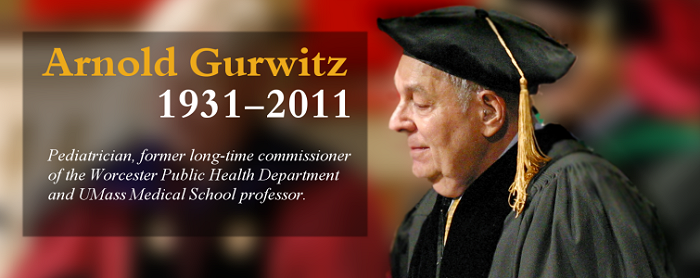
Pediatrician, former long-time commissioner of the Worcester Public Health Department and UMass Medical School professor Arnold Gurwitz, 79, died in his home on Jan. 15. His friend Leonard J. Morse, MD, affiliate in medicine and family medicine & community health and himself a long-time Worcester public health commissioner, reflects on an extraordinary life.
Arnold Gurwitz, MD, died on Jan. 15 after a long illness. A life-long resident of Worcester, interrupted only by service in the U.S. Air Force, he practiced pediatrics for more than 35 years. In addition, he served Worcester as commissioner of public health from 1969 to 1994. His efforts on behalf of the city were recognized and deeply appreciated. It was my privilege to have known him as a friend and colleague for 48 years. Despite many personal tragedies, Arnie demonstrated extraordinary acts of generosity and devotion.
His dear wife, Rhoda, died at age 44, leaving him with four children. During Rhoda’s illness we met weekly for breakfast at 7 a.m. and continued the ritual for 30 plus years. Arnold never complained. He always met his obligations in life responsibly, demonstrating service above self. He never uttered “why me.”
A few years after Rhoda’s death, his youngest daughter Barbara, an accomplished dancer, developed bone cancer that necessitated an amputation and chemotherapy. During a college semester while studying in Italy, she died suddenly of a cardiac arrhythmia, a presumed risk from a specific chemotherapeutic medicine. And throughout his own lengthy illness and confinement he never complained, always answering health inquiries with “I’m still here.”
Among his many accomplishments as commissioner of public health, three events are memorable. In 1969, there was a very significant increase of hepatitis A virus (HAV) infection in Worcester, including the infamous outbreak that befell 90 of 97 members of the varsity football team of the College of the Holy Cross. The diagnosis was based on solid clinical and epidemiological information prior to the era of specific laboratory viral confirmation.
Worcester was becoming known as “Hepatitisville” and there was increased community concern as well as national and international awareness. Dr. Gurwitz and I were interviewed on the Holy Cross College radio station fielding questions from the college community offering assurance that the municipal water was safe to drink. Years later when laboratory science had advanced, HAV was precisely confirmed, from frozen specimens.
In 1978, on the occasion of the 100th anniversary of the Worcester Department of Public Health, Dr. Gurwitz, as commissioner, hosted an academic conference dedicated to the “Conquest of Disease.” During the program, Dr. Albert Sabin was presented with an engraved Paul Revere bowl from the school children of Worcester in recognition of his development of the live oral poliomyelitis vaccine.
And in 1985, in the presence of a protracted outbreak of hepatits B virus (HBV) infection that involved 1,300 people with eight deaths, the city was offered the first use of a newly developed HBV vaccine to immunize intimate contacts of those infected to extinguish the infection in similar fashion to smallpox eradication.
Dr. Gurwitz was very early to rise and was very well known on Water Street. Each Sunday, in advance of our 7 a.m. breakfast appointment, he had already delivered fresh hot bulkie rolls and bagels to the staff in the nurseries, intensive care units and emergency rooms at three hospitals. He loved grocery shopping and cooking, and his turkey stuffing and cabbage soup recipes have been published.
In 1999, Arnold Gurwitz received the Career Achievement Award from the Worcester District Medical Society. In 2003, he was awarded an honorary doctor of science degree from the UMass Medical School, where he was an assistant professor of clinical pediatrics and a member of the Residency Advisory Committee for the preventive medicine residency program.
Dr. Gurwitz is survived by three children and their spouses: Dr. Jerry Gurwitz, executive director of the Meyers Primary Care Institute and professor of geriatric medicine at UMMS, and his wife Dr. Leslie Fish, senior director of pharmacology services for the Fallon Community Health Plan; Linda Mogren, Esq., and her husband, professor Eric Mogren of Sycamore, Ill.; and Elaine Atlas and her husband, Dr. Ian Atlas, of Randolph, N.J. He is also survived by his sister Blossom Zabarsky and seven grandchildren.
Everyone has a history. Despite his tribulations, Arnold Gurwitz’s shoulders were extremely strong. He practiced most compassionate medicine to his patients and served as a very dependable guardian for their parents. He did it very well.
Because of who Arnold Gurwitz was, he will always be remembered.